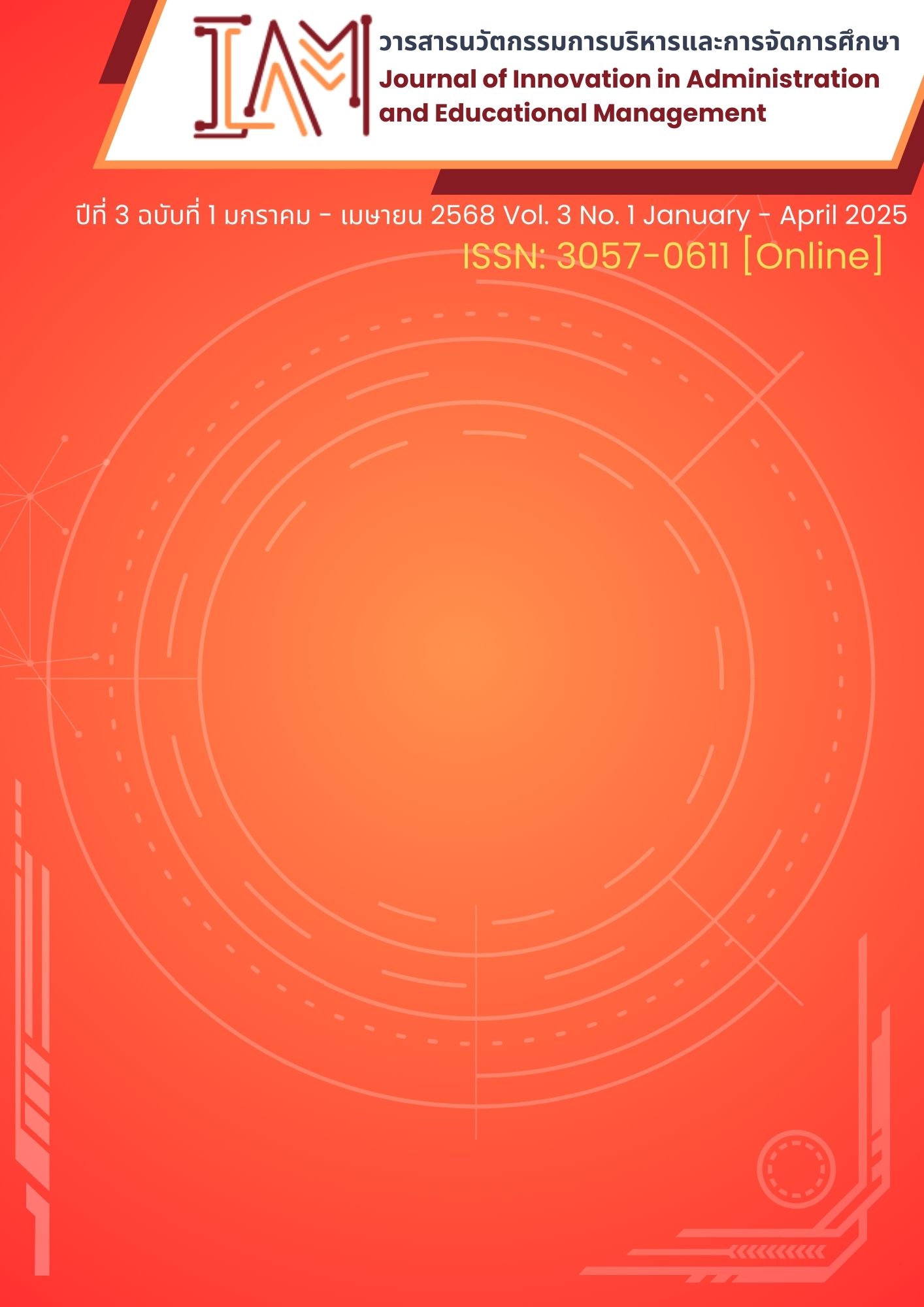ฮูส์คอลล์ : แอปพลิเคชันปัญญาประดิษฐ์ยอดฮิตของ พลเมืองดิจิทัลป้องกันการหลอกลวงบนโลกออนไลน์
คำสำคัญ:
ฮูส์คอลล์, แอปพลิเคชันปัญญาประดิษฐ์, พลเมืองดิจิทัล, การหลอกลวงบนโลกออนไลน์บทคัดย่อ
บทความวิชาการนี้มีวัตถุประสงค์เพื่อให้ความรู้ และบูรณาการในการจัดการเรียนรู้โดยใช้แอปพลิเคชันฮูส์คอลล์ เป็นเครื่องมือในการช่วยอำนวยความสะดวกการดำรงชีวิตของมนุษย์ให้มีประสิทธิภาพ โดยช่วยตรวจสอบสายเรียกเข้าที่ไม่ได้บันทึกไว้ในสมาร์ทโฟน และเป็นตัวช่วยใน
การจัดการข้อความที่ส่งเข้ามาภายในเครื่องโทรศัพท์มือถืออย่างรัดกุม ทั้งนี้ยังสามารถนำแอปพลิ
เคชันฮูส์คอลล์ให้เป็นสื่อการเรียนรู้บูรณาการเพิ่มทักษะความเป็นพลเมืองดิจิทัลผ่านกิจกรรมการเรียนการสอนในชั้นเรียนเรื่อง ความปลอดภัยในการใช้งานเทคโนโลยีสารสนเทศ เพื่อให้ผู้เรียนมีภูมิคุ้มกันที่ดีในการรับมือกับสถานการณ์ต่างๆทางโลกออนไลน์ที่ต้องเผชิญในอนาคต แม้ว่าเทคโนโลยีนั้นจะมีประโยชน์มากมายแต่ยังมีความเสี่ยงสูงมากเช่นกันเมื่อถูกใช้งานในทางที่ผิด ดังนั้น การจัดการเรียนรู้ด้วยแอปพลิเคชันปัญญาประดิษฐ์นี้ จะช่วยส่งเสริมความเป็นพลเมืองดิจิทัลของ ผู้เรียน และพัฒนาความรู้ในด้านการใช้เทคโนโลยีอย่างรู้เท่าทัน และเทคนิคในการใช้ป้องกันและรับมือกับสถานการณ์การถูกหลอกลวงบนโลกออนไลน์ได้อย่างมีประสิทธิภาพมากยิ่งขึ้น
Downloads
เอกสารอ้างอิง
กระทรวงศึกษาธิการ. (2567). นโยบายและจุดเน้นของกระทรวงศึกษาธิการประจำปีงบประมาณ พ.ศ. 2567. สืบค้น 9 ตุลาคม 2567, จาก https://www.moe.go.th/360policy-and-focus-moe-fiscal-year-2024/.
กรุงไทย. (2566). 5 แอปฯ ดีต่อใจ โหลดติดเครื่องไว้ เช็กเบอร์แปลกกวนใจ เลี่ยงภัยแก๊ง
คอลเซ็นเตอร์. สืบค้น 2 พฤศจิกายน 2567, จาก https://krungthai.com/th/krungthai-update/announcement-detail/2689.
ธนภัทร ทองสอน. (2564). อาชญากรรมแก๊งคอลเซ็นเตอร์. สืบค้น 18 พฤศจิกายน 2567, จาก https://researchcafe.tsri.or.th/call-center-crime/.
วรรณวิสา จันทร์ประไพ. (2566). Whoscall แอปพลิเคชันระบุตัวตนสายเรียกเข้าที่ไม่รู้จัก ป้องกันการหลอกลวงทางโทรศัพท์. สืบค้น 19 ตุลาคม 2567, จากhttps://thaiinnovation.
center/2021/09/whoscall/#.
สำนักงานตำรวจแห่งชาติ. (2567). สถิติการรับแจ้งความออนไลน์ในระบบTHAIPOLICEONELINE.COM. สืบค้น 13 พฤศจิกายน 2567, จาก https://lookerstudio
google.com/reporting/8e0a90a3-6d9f-4ea7-9700-ba593d29ff99/page/CTNID?s
=ubi78SG7yjo.
อุทิศ บำรุงชีพ. (2566). นวัตกรรมสร้างสรรค์เพื่อการเรียนรู้สู่ความเป็นพลเมืองดิจิทัล. ชลบุรี: ชลบุรีการพิมพ์.
Elliott, S.N., Kratochwill, T.R., Littlefield Cook, J. & Travers, J. (2000). Educational
psychology: Effective teaching, effective learning (3rd ed.) . Boston, MA:
McGraw-Hill College.
Mandala AI. (2023). What is Artificial intelligence (AI)?. Retrieved November 15, 2024, from https://www.mandalasystem.com/blog/th/297/What-is-artificial -intelligence-AI.
Sanook. (2023). WhosCall. Retrieved September 2, 2024, from https://www.sanook
.com/campus/1415783/.
Siemens, G. (2006b). Connectivism: Learning theory or pastime of the self-amused? Elearnspace blog. Retrieved November 8, 2024, from www.semanticscholar
.org/paper/Connectivism%3A-Learning-Theory-or-Pastime-of-the-Siemens/
f1e0c4938906fe2b6cc7df9308ab87bded1a745.
Techsauce Team. (2022). Whoscall. Retrieved October 19, 2024, from https://techs
auce.co/tech-and-biz/whoscall-review-how-to-use.
WhoscallTH. (2023). The features of the WhosCall Application. Retrieved October 19, 2024, from https://whoscall.com/th/blog/articles/787-Whoscall%20รายงานประจำปี%202564
ดาวน์โหลด
เผยแพร่แล้ว
รูปแบบการอ้างอิง
ฉบับ
ประเภทบทความ
สัญญาอนุญาต
ลิขสิทธิ์ (c) 2025 วารสารนวัตกรรมการบริหารและการจัดการศึกษา

อนุญาตภายใต้เงื่อนไข Creative Commons Attribution-NonCommercial-NoDerivatives 4.0 International License.






